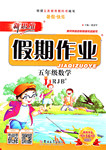题目内容
8.For many years there's been a debate about rewarding our children.Does it work?Is it effective?Some people think we should establish a standard with our kids and give them something for meeting this standard as a reward.Punishment is given out in much the same way,but it's used when certain standards of performance,behavior,etc.have not been met.Kids will often become more dutiful when threatened with punishment,and work harder when promised a valuable reward.The problem is what happens when you aren't around.
To develop responsible,self-disciplined kids,parents need to promote certain ideas.One of these ideas is that everyone pitches in and helps in your family.Another idea is that there can be enjoyment in doing any task if we choose to make it so.When a task is for a worthy cause ( our family can enjoy the house more because I helped clean it),this message can have a big impact.
This is how we help our kids develop a sense of responsibility.When our children develop this responsibility,they'll be more disciplined,and they'll control their emotions better.When we give rewards to our kids,we reduce the sense of responsibility.We also create children who may temporarily perform to a certain standard,but who aren't likely to continue the performance without the carrot hanging in front of them.
"Rewards and punishment can change behavior for a while,but they cannot change the person who engages in the behavior,"said Alfie Kohn,author of Punished by Rewards."Good values have to be grown from the inside out."Parents can help give their children a sense of shared responsibility and discipline which can last a life time.The real rewards that your children receive will be their readiness for the complex and demanding world that waits for them-a world that rewards those who have learned the secrets of discipline responsibility.So keep those shiny rewarding to yourself,and let your kids find their own rewards.
36.According to the passage,when children are threatened with punishment,B.
A.they may lose interest in their work
B.they may appear to be well-behaved
C.they may change to another person
D.the results will be worse than usual
37.What can we know from Paragraph 3?A
A.Parents should promote certain ideas to help children develop.
B.Children should be responsible for their discipline.
C.Children should help build a good family atmosphere.
D.No children will adapt to society without their parents'help
38.The underlined part"the carrot"in Paragraph 4probably refers toA.
A.rewards
B.aims
C.apologies
D.doubts
39.According to the passage,Alfie Kohn would agree that parents shouldD.
A.never pay attention to the way their children do things
B.show their children how to behave by example
C.never punish their children
D.help their children establish good values
40.What's the best title for the passage?B
A.Do you often reward your children?
B.Should parents reward their children?
C.When should parents reward their children?
D.What can parents reward their children with?
分析 文章讲述了该不该给孩子奖励,通过奖惩的方式能不能培养孩子的责任感.文章介绍了不同的观点,作者认为培养孩子的关键是让孩子树立正确的价值观,这才是让孩子收益终身的好品质.
解答 BAADB
36.B 细节理解题.文章第二段说Kids will often become more dutiful when threatened with punishment,and work harder when promised a valuable reward,当孩子们受到惩罚的威胁时,会变得更负责,有奖励时,会更努力.故选B.
37.A 细节理解题.第三段说To develop responsible,self-disciplined(自律的)kids,parents need to promote certain ideas为了培养有责任感,自律的孩子,父母需要更新理念.故选A.
38.A 猜测词意题.划线单词所在的句子说We also create children who may temporarily(临时)perform to a certain standard,but who aren't likely to continue the performance without the carrot hanging in front of them给了孩子某种标准,孩子有好的表现是临时的,如果没有了奖励他们就不会继续表现良好了,可以知道划线部分应该是和前面的reward表达一样的意思.故选A.
39.D 细节推断题.文章第五段说Good values have to be grown from the inside out好的价值观是来自内心的;Parents can help give their children a sense of shared responsibility and discipline which can last a lifetime父母应该帮助孩子养成有责任感和自律的品格,这些可以让他们收益终身.故选D.
40.B 主旨大意题.文章一开始说For many years there's been a debate about rewarding our children.Does it work?Is it effective多年来人们都在争论该不该给孩子奖励,到底有没有效果.后面讲述了不同的观点.故选B.
点评 学生需要认真阅读原文,把握文章大意,对文章脉络有整体的了解,能仔细查找文中细节,并能根据文章内容进行合理的推测判断.

 新思维假期作业寒假吉林大学出版社系列答案
新思维假期作业寒假吉林大学出版社系列答案| A. | damage | B. | injury | C. | wound | D. | ruin |
| A. | consequences | B. | independence | C. | competence | D. | intelligence |